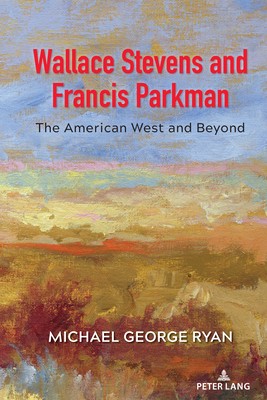
- We will send in 10–14 business days.
- Author: Michael George Ryan
- Publisher: Peter Lang Inc., International Academic Publishers
- ISBN-10: 1433199688
- ISBN-13: 9781433199684
- Format: 15.2 x 22.9 x 1.3 cm, hardcover
- Language: English
- SAVE -10% with code: EXTRA
Reviews
Description
Wallace Stevens and Francis Parkman: The American West and Beyond identifies previously unacknowledged influence from Francis Parkman's historical narratives on the poems of Wallace Stevens. Author Michael George Ryan argues that Parkman, celebrated historian of the American West and the European colonization of North America, was a source of enduring fascination and inspiration for Stevens. This influence can be traced throughout Stevens' career: early on, the poems reacting to Parkman were whimsical and playful ("The Comedian as the Letter C," "Cy Est Pourtraicte, Madame Ste Ursule, et Les Unze Mille Vierges"); later, they became more meditative and serious ("The Auroras of Autumn," "The Bouquet").
The likelihood that Parkman served as a source for Stevens - especially in the later poems - opens up a variety of new readings. Once we see Henry Chatillon (Parkman's The Oregon Trail) catapulted into Stevens' "The Auroras of Autumn," the poem takes on new meaning. Colonel Henry Bouquet (Parkman's Conspiracy of Pontiac) may be hiding out in "The Bouquet." And, once, the reader begins to sense Jesuit ghosts (Parkman's The Jesuits in North America) as specters of remembrance in "St Armorer's from the Outside," they will more easily engage the poem, and perhaps better understand Stevens' late conversion to Catholicism.
Stevens was not always distant, not always a solipsistic poet. At least at times, he was deeply in touch with his world and deeply affected by it, as he aspired to grow beyond the historical burdens so deeply embedded in the American experience. All Stevens readers will benefit from reading this book, and in particular anyone with an interest in what makes Stevens a decidedly American poet.
EXTRA 10 % discount with code: EXTRA
The promotion ends in 20d.04:29:52
The discount code is valid when purchasing from 10 €. Discounts do not stack.
- Author: Michael George Ryan
- Publisher: Peter Lang Inc., International Academic Publishers
- ISBN-10: 1433199688
- ISBN-13: 9781433199684
- Format: 15.2 x 22.9 x 1.3 cm, hardcover
- Language: English English
Wallace Stevens and Francis Parkman: The American West and Beyond identifies previously unacknowledged influence from Francis Parkman's historical narratives on the poems of Wallace Stevens. Author Michael George Ryan argues that Parkman, celebrated historian of the American West and the European colonization of North America, was a source of enduring fascination and inspiration for Stevens. This influence can be traced throughout Stevens' career: early on, the poems reacting to Parkman were whimsical and playful ("The Comedian as the Letter C," "Cy Est Pourtraicte, Madame Ste Ursule, et Les Unze Mille Vierges"); later, they became more meditative and serious ("The Auroras of Autumn," "The Bouquet").
The likelihood that Parkman served as a source for Stevens - especially in the later poems - opens up a variety of new readings. Once we see Henry Chatillon (Parkman's The Oregon Trail) catapulted into Stevens' "The Auroras of Autumn," the poem takes on new meaning. Colonel Henry Bouquet (Parkman's Conspiracy of Pontiac) may be hiding out in "The Bouquet." And, once, the reader begins to sense Jesuit ghosts (Parkman's The Jesuits in North America) as specters of remembrance in "St Armorer's from the Outside," they will more easily engage the poem, and perhaps better understand Stevens' late conversion to Catholicism.
Stevens was not always distant, not always a solipsistic poet. At least at times, he was deeply in touch with his world and deeply affected by it, as he aspired to grow beyond the historical burdens so deeply embedded in the American experience. All Stevens readers will benefit from reading this book, and in particular anyone with an interest in what makes Stevens a decidedly American poet.


Reviews